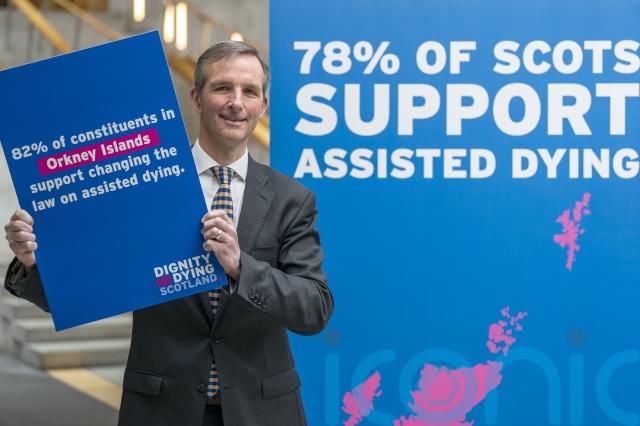
The Scottish Parliament will need the backing of Westminster if assisted dying is to become the law, legal experts have warned.
Three experts, from Glasgow, Strathclyde and Edinburgh universities, insisted there is “little doubt” that a Bill brought forward by Liberal Democrat MSP Liam McArthur exceeds Holyrood’s powers.
In an article on Scottish Legal News the experts said the “primary purpose” of his Assisted Dying for Terminally Ill Adults (Scotland) Bill “relates to the reserved matter of regulating the health professions”.
As such, they argued that if Holyrood passes the legislation a Section 30 order would be needed from Westminster to allow the proposals to proceed.
Such orders have been granted before – most notably, a Section 30 order was required for the 2014 independence referendum to take place.

But the academics – who include Dr Mary Neal of Strathclyde University, who was the expert adviser to MSPs scrutinising a previous assisted suicide Bill at Holyrood – stressed that such “requests are not always granted”, adding that if they are “the process can take 12 to 18 months”.
Dr Neal, together with Dr Murray Earle, a lecturer in medical law at Edinburgh University, and Dr Michael Foran, who is a law lecturer at Glasgow University, argued that if the Bill was to become law it would “specify in some detail the requirements that health professionals must follow at every stage of the process: before, during, and after the death of the patient”.
The three experts added: “As such, in our view, the overall focus and primary purpose of the Bill lies beyond the legislative competence of Holyrood.”
They added: “In our view, the Bill as a whole requires a Section 30 Order.
“But whether the issues with legislative competence affect the Bill as a whole or are tied to particular provisions, there could be a long and contentious road ahead for the Assisted Dying Bill at Holyrood.
“There is considerable potential for conflict, not only around the hugely controversial issue of assisted dying itself, but also over divisive constitutional questions of devolved versus reserved powers.”

The claims were made as Holyrood’s Health Committee prepares to report on the general principles of the Bill ahead of a crucial vote at Holyrood.
Mr McArthur’s Bill sets out to change the law to allow people aged 16 and over who have been diagnosed with a terminal illness to seek help to end their life.
However, Health Secretary Neil Gray has already made clear he believes the legislation “in its current form is outside the legislative competence of the Scottish Parliament”.
Mr Gray said told the Health Committee earlier this year that the part of the Bill concerning the drugs or substance someone would be given to end their life “appears to relate to the reserved matter of medicines, medical supplies and poisons”.
He also said there were “concerns some of the other provisions in the Bill may relate to the reserved matter of regulation of health professionals”.
However, Mr McArthur stressed Holyrood’s Presiding Officer has “certified that the Bill is within the powers of the Parliament as it stands and can be passed by the Scottish Parliament”.
Mr McArthur stated: “I have always been clear that in order for the new law I’m proposing to work in the way I envisage, both UK and Scottish governments would need to agree on the transfer of certain powers.
“There are established mechanisms for doing this, a point recognised by Dr Neal, Dr Earle and Dr Foran in their assessment of the Bill.
“Once MSPs have decided if they back the general principles of my Bill at Stage 1, I would expect both governments to take forward this work in keeping with the will of parliament.”
Mr McArthur continued: “Our current laws on assisted dying are failing too many terminally ill Scots, often leaving them facing an undignified and sometimes painful death despite the very best efforts of palliative care.
“Any change in the law to allow for more choice and compassion at the end of life must be introduced carefully and sensitively, which is why I have taken the approach I have in relation to drafting my Bill and consulting with the widest possible range of stakeholders.
“That is the right approach and what the public in Scotland, who remain overwhelmingly supportive of a change in the law, have a right to expect from their parliamentarians.”
Subscribe or register today to discover more from DonegalLive.ie
Buy the e-paper of the Donegal Democrat, Donegal People's Press, Donegal Post and Inish Times here for instant access to Donegal's premier news titles.
Keep up with the latest news from Donegal with our daily newsletter featuring the most important stories of the day delivered to your inbox every evening at 5pm.